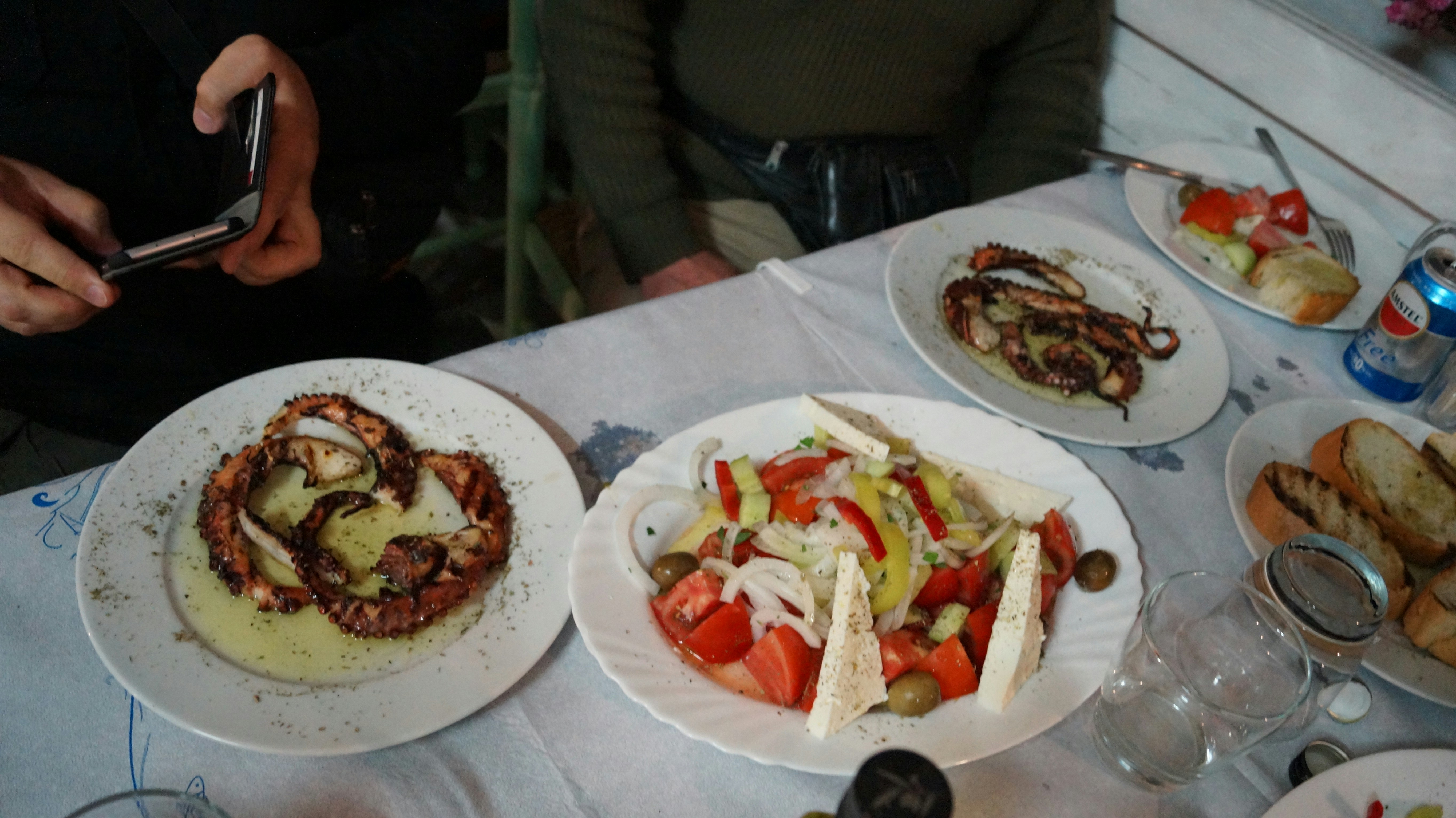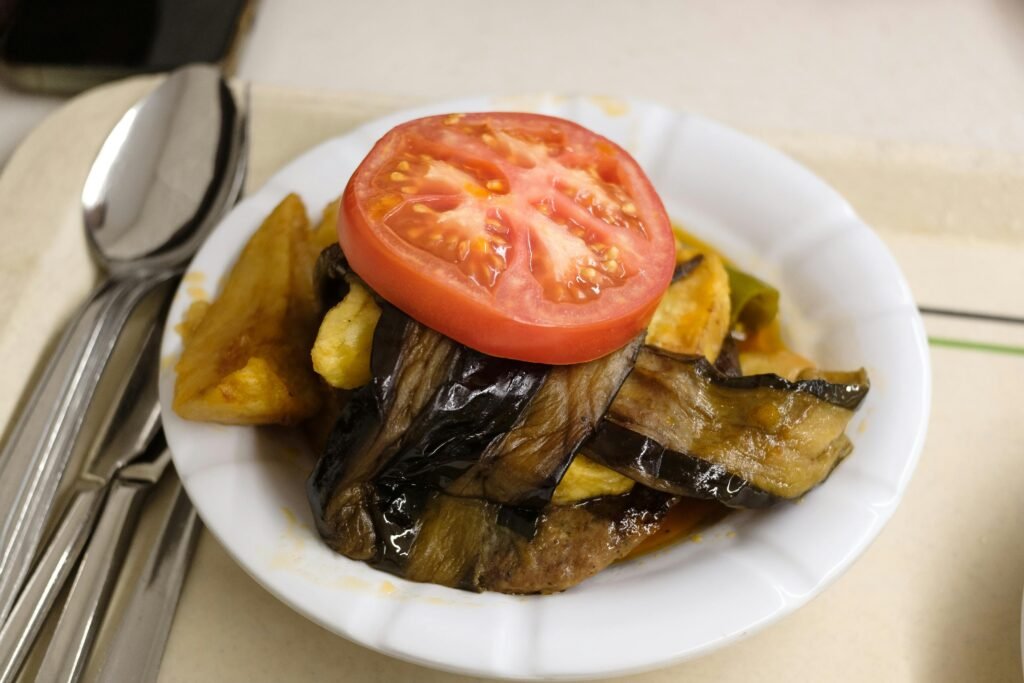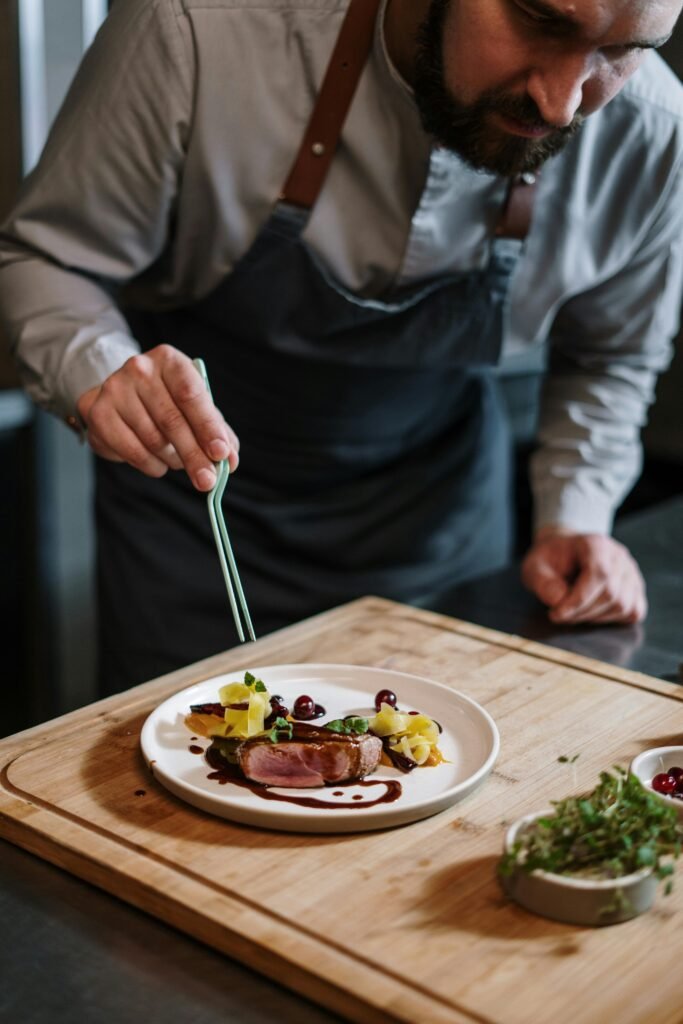Introduction
Greek cuisine is a vibrant expression of the country’s rich history, geographical diversity, and cultural influences. A culinary journey through Greece unveils a tapestry of flavors shaped by ancient traditions, the Mediterranean climate, and local agricultural practices. Factors such as geography, climate, and regional cultures have created distinct culinary styles in various parts of Greece, each contributing to the uniqueness of Greek gastronomy.

Historically, Greece has been influenced by various civilizations, including the Minoans, Mycenaeans, and later the Romans and Ottoman Turks. These encounters enriched its culinary practices, resulting in a delightful fusion of tastes and cooking techniques. Greek food mirrors the country’s agricultural bounty, emphasizing the importance of seasonal ingredients and sustainable practices. Olive oil, a staple in Greek culinary traditions, is often touted as a cornerstone ingredient, lending dishes a distinct flavor and enhancing nutritional qualities.
Fresh herbs such as oregano, thyme, and dill are equally significant in Greek cooking, imparting aromatic undertones that elevate the simplest of ingredients. Moreover, local produce such as tomatoes, eggplants, and cucumbers form the foundation of popular dishes. The combination of these ingredients creates a palate that is both wholesome and satisfying, reflective of the Mediterranean diet, which is renowned for its health benefits.
The significance of communal dining in Greek culture cannot be overstated. Meals often bring together family and friends, embodying a sense of community and shared experience. As visitors delve into Greek cuisine, they are encouraged to savor not only the food itself but also the hospitality and warmth that accompany it. This communal aspect enhances the enjoyment of traditional dishes and highlights why Greek cuisine is a must-try for anyone eager to explore a culinary landscape steeped in flavor and history.
Moussaka: The Quintessential Greek Comfort Food
Moussaka is widely regarded as a hallmark of Greek cuisine, exemplifying the country’s ability to blend rich flavors and textures into a single dish. Traditionally, this comforting meal features layers of eggplant, spiced minced meat, and a creamy béchamel sauce, resulting in a harmonious combination that is both satisfying and flavorful. The origins of moussaka can be traced back to the Ottoman period, although it has evolved significantly over the years. Variations exist in different regions of Greece, each offering a unique twist on the classic recipe. For instance, some areas may include potatoes or other vegetables, while others may use different proteins, such as lamb or even vegetarian alternatives.

To experience authentic moussaka, it is advisable to seek out local tavernas and restaurants that prepare the dish from scratch, as many commercial establishments may take shortcuts. Look for places where the eggplant is freshly grilled or baked, as this enhances the natural sweetness of the vegetable and adds depth to the dish. The béchamel sauce should be creamy and light, devoid of any overly thick texture that can mask the flavors. It is also worth noting that a great moussaka often showcases a well-seasoned minced meat mixture, highlighting the use of herbs such as oregano and mint, which are staples in Greek cooking.
Popular destinations for exceptional moussaka include classic eateries in Athens, where you can find the dish served alongside traditional Greek salads. The island of Santorini is also known for its take on moussaka, often incorporating local cheeses that elevate the dish even further. Regardless of where one chooses to indulge, ensuring that the moussaka is prepared with fresh ingredients and care is key to fully appreciating this quintessential Greek comfort food. This layered delight not only represents the culinary artistry of Greece but also holds a special place in the hearts of those who savor it.
Souvlaki: The Ultimate Street Food Experience
Souvlaki, a quintessential street food in Greece, is not merely a meal but an experience that encapsulates the essence of Greek culinary culture. Typically consisting of skewered and grilled meat, usually pork, chicken, or lamb, souvlaki is adored for its convenience and robust flavor. Each region in Greece boasts its own unique take on this beloved dish, making it a remarkable subject for culinary exploration. In cities like Athens, one might indulge in traditional souvlaki, while in other locales, variations may include additional ingredients or serving styles.

The cultural significance of souvlaki surpasses its role as a mere food item. It often serves as a staple in social gatherings, family celebrations, and casual outings. As people gather around souvlaki stands or eateries, the atmosphere is filled with chatter and laughter, solidifying the dish’s status as a social connector. This cultural importance is evident in the way locals prioritize sharing souvlaki with friends and family, transforming each meal into a communal occasion. It is not uncommon to see souvlaki being grilled fresh to order, drawing crowds and creating an exhilarating ambiance that enhances the enjoyment of the food.
For an authentic experience, travelers are encouraged to seek out iconic souvlaki stands and establishments across Greece. In Athens, for instance, Kostas is renowned for its delicious pork souvlaki served in a warm pita with fresh tomatoes and onions. Alternatively, in Thessaloniki, one can find the popular eatery Souvlaki Kavouras, which elevates the traditional dish with unique marinades and side offerings. Regardless of where you may find yourself in Greece, tasting souvlaki is an essential part of any culinary journey, allowing visitors to experience not only the flavors but also the vibrant culture that surrounds this iconic dish.
Seafood Fresh from the Aegean: A Taste of the Mediterranean
Greek cuisine is renowned for its rich flavors and diverse ingredients, with seafood holding a prominent place, especially in coastal regions. The Aegean Sea, teeming with life, offers an abundance of fresh catch that plays a significant role in traditional Greek dishes. Seafood is not merely a meal in Greece; it is a cultural experience, connecting diners with the essence of the Mediterranean. From grilled octopus to tender calamari, seafood captures the flavors of the region, making it a must-try for visitors.
One of the most iconic dishes is grilled octopus, often marinated with olive oil, vinegar, and oregano, before being char-grilled to perfection. The smoky aroma and tender yet slightly chewy texture create a unique taste that represents the essence of Aegean culinary traditions. Calamari, another popular dish, is typically prepared by breading and frying, resulting in a crispy exterior that invites a succulent bite. Both dishes can be found in various seaside tavernas, where the ocean’s bounty is highlighted in vibrant settings, enhancing the overall dining experience.
When seeking the freshest seafood, look for eateries located near fishing ports. These establishments often have access to daily catches and showcase them prominently on their menus. Choosing a taverna with a prompt turnaround of seafood dishes reflects the establishment’s commitment to quality. Seasonal specialties might also be worth exploring, as local chefs often infuse their cooking with the freshest market finds. For an authentic experience, try dining during the lunch hours, when seafood is often at its peak freshness and flavor.
In addition to octopus and calamari, consider sampling other regional specialties like grilled sardines and seafood risotto, each offering its own unique taste of the Aegean. By venturing into local markets or enjoying meals by the sea, one can truly appreciate how integral fresh seafood is to the culinary identity of Greece.
Desserts to Satisfy Your Sweet Tooth
Greece, a nation steeped in rich history and vibrant culture, offers a plethora of delightful desserts that reflect its culinary heritage. Among the most notable are baklava and loukoum, two sweets that not only tantalize the taste buds but also carry profound cultural significance. Baklava, characterized by its layers of flaky phyllo pastry, chopped nuts, and honey syrup, has origins tracing back to the Ottoman Empire. This delectable treat can be found across various regions in Greece, each with subtle variations that add a unique twist.
The layers of phyllo create a satisfying crunch, while the mixture of nuts—often walnuts or pistachios—provides a rich flavor enhanced by aromatic spices like cinnamon. The finishing touch of honey syrup, drizzled generously over the top, lends a sticky sweetness that has made baklava an enduring favorite among locals and tourists alike.
On the other hand, loukoum, sometimes referred to as Greek delight, plays an equally important role in Greek confectionery. This gelatinous treat, typically flavored with rose or mastic, provides a different texture and taste experience. Traditionally served as a compliment to coffee, loukoum is frequently sprinkled with powdered sugar or coconut for added sweetness and visual appeal. This dessert embodies the Greek custom of hospitality, as offering a piece of loukoum to guests is a common practice in many households.
When exploring Greek desserts, one should not overlook regional specialties. For example, in Crete, you might encounter “kalitsounia,” sweet cheese pastries often infused with local herbs and honey, offering a distinct twist to the traditional treats. Likewise, Santorini’s “tomatokeftedes,” while primarily a savory dish, might come coupled with local honey for a sweet surprise. Whether enjoyed at a local taverna or acquired from a stylish pastry shop, indulging in these desserts is an essential part of experiencing Greece’s rich culinary tapestry.
Culinary Regions of Greece: Where to Taste Each Dish
Greece is a nation rich in culinary diversity, with each region presenting a unique palette of flavors that reflects its history, geography, and local produce. Among the most notable culinary regions is Crete, renowned for its healthy Mediterranean diet emphasizing olive oil, fresh vegetables, and local cheeses. In Crete, one may savor traditional dishes such as Cretan dakos (barley rusk topped with tomatoes and feta) and moussaka (a baked dish with layered eggplant and minced meat). Culinary tours in this region often include hands-on cooking classes, allowing participants to learn and appreciate the island’s vibrant gastronomic traditions.
Moving towards the Peloponnese, visitors can embark on a flavorful journey through its olive groves and vineyards. This peninsula boasts specialties like pastitsio and lahanosalata (cabbage salad), showcasing the area’s reliance on seasonal ingredients. The Peloponnese is also famed for its wines, particularly those produced in the Nemea region. Culinary experiences here may include vineyard tours combined with wine tastings and local meal pairings that highlight regional tastes and folk traditions.
Lastly, the Cyclades islands are celebrated for their fresh seafood and unique local delicacies. Dishes such as fava (split pea puree) and choriatiki (Greek salad) capture the essence of this sun-kissed region. Culinary tours in the Cyclades often focus on island hopping, allowing food enthusiasts to enjoy cooking demonstrations in picturesque settings, coupled with visits to local markets where the freshest ingredients are sourced.
Exploring these culinary regions not only offers a taste of traditional Greek cuisine but also immerses travelers in the vibrant local cultures that celebrate their rich gastronomic heritage. From Crete to the Cyclades, each bite tells a story of Greece’s culinary landscape, deepening the appreciation for this Mediterranean gem.
Finding Authentic Greek Cuisine: Tips for Foodies
When embarking on a culinary adventure in Greece, the quest for authentic Greek cuisine can be as fulfilling as the dishes themselves. To ensure a genuine gastronomic experience, travelers should consider several practical tips. Firstly, seek out family-owned restaurants over tourist traps; these establishments often serve recipes passed down through generations, providing a richer taste of Greek culture. Local family-run tavernas typically offer a warm atmosphere, and the personal touch of home-cooked meals cannot be overstated.

Asking locals for recommendations can significantly enhance your dining experience. They often know the hidden gems that offer the best traditional dishes. Engaging with residents about their favorite eateries not only yields valuable insights but also fosters a sense of community and shared culture. Do not hesitate to inquire about seasonal specialties, as these dishes are frequently prepared with the freshest ingredients, reflecting the vibrancy of the local produce.
Dining etiquette in Greece is also an essential aspect of enjoying authentic cuisine. Greeks often believe in the importance of sharing meals, which symbolizes togetherness and hospitality. Opt for shared plates, as this allows you to sample multiple flavors and experience various dishes. When dining out, it is common to see a diversity of meze—small plates meant to be shared—with friends or family. Additionally, showing appreciation and complimenting the food can strengthen your connection with the host and enhance the overall dining experience.
Lastly, embrace the leisurely pace of dining in Greece. Meal times are often extended, allowing one to truly enjoy the food and the company of those at the table. By taking the time to savor each dish and engaging with your dining companions, you will not only indulge in authentic Greek cuisine but also immerse yourself in the cultural fabric of this beautiful country.
Food Festivals and Events: A Celebration of Greek Cuisine
Greece is not only known for its stunning landscapes and rich history but also for its vibrant food culture, prominently showcased through numerous food festivals held throughout the year. These events serve as a celebration of Greek cuisine, offering locals and visitors alike the chance to indulge in traditional dishes, learn age-old cooking techniques, and engage with the passionate artisans who create these culinary delights.
One of the most notable festivals is the Athens Street Food Festival, which typically takes place every summer. This event highlights the diversity of Greek street food, from mouth-watering souvlaki to delectable gyros. Attendees have the opportunity to sample a variety of dishes, ranging from traditional recipes to modern interpretations. Additionally, this festival features cooking demonstrations, where visitors can learn directly from expert chefs about the preparation of iconic Greek meals.
Another important event is the Kalamata Olive Festival, celebrated in the municipality of Kalamata each September. This festival not only focuses on the renowned Kalamata olive but also showcases olive oil tastings, cooking workshops, and local delicacies inspired by this essential ingredient. Participants can learn about the intricate process of olive harvesting and pressing, enhancing their culinary knowledge while enjoying the local flavors.
The annual Santorini Gastronomy Festival, held in September, is another must-visit for food lovers. This event highlights Santorini’s famous local products, such as tomatoes, fava beans, and wine. Visitors can participate in various workshops and tastings, discovering the island’s unique takes on traditional dishes.
To fully experience these culinary celebrations, it is advisable to secure accommodations in advance, as festival dates can attract a significant number of visitors. Engaging with local chefs and producers during these events not only enriches one’s understanding of Greek cuisine but also promises an unforgettable gastronomic adventure.
Conclusion: Your Culinary Journey Awaits
Experiencing Greek cuisine is an essential part of immersing oneself in the rich culture and history of Greece. As you embark on your culinary journey, it becomes apparent that the flavors of this Mediterranean paradise are as diverse as its landscapes. Each dish tells a story, whether it originates from the fertile plains, the rugged mountains, or the azure coastlines. Greek food is a reflection of the country’s heritage, combining fresh ingredients, time-honored recipes, and a deep connection to the land.
While iconic staples like moussaka and souvlaki often steal the limelight, it is vital to explore beyond these well-known dishes. The regional specialties, such as the tangy saffron-infused seafood dishes of the Aegean or the hearty stews from the mountainous regions, provide a comprehensive understanding of Greece’s culinary landscape. Each bite offers insight into the traditions, local agriculture, and the vibrant spirit of the people.
Moreover, indulging in these authentic flavors not only satisfies the palate but also enriches the travel experience. Interactions with local tavern owners, farmers, and chefs can establish a deeper connection to the country’s rich culinary traditions. Engaging with the local dining scene, attending food festivals, or even participating in cooking classes can enhance your overall appreciation of Greek cuisine.
In essence, your culinary adventure through Greece is an opportunity to embrace a culture that places immense value on community, family, and the joy of shared meals. So, as you prepare for your travels, consider this journey not just as a taste of Greece, but as an exploration of its very soul. Let the enticing aromas and diverse flavors guide you through the regions, ensuring that your experience is both memorable and delicious.








